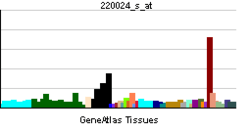PRX (gene)
Periaxin is a protein that in humans is encoded by the PRX gene.[3][4][5]
The PRX gene encodes L- and S-periaxin, proteins of myelinating Schwann cells, and is mutated in Dejerine-Sottas syndrome (MIM 145900) and Charcot-Marie-Tooth disease type 4F (MIM 145900).[supplied by OMIM][5]
References
- ↑ "Human PubMed Reference:".
- ↑ "Mouse PubMed Reference:".
- ↑ Gillespie CS, Sherman DL, Fleetwood-Walker SM, Cottrell DF, Tait S, Garry EM, Wallace VC, Ure J, Griffiths IR, Smith A, Brophy PJ (Jun 2000). "Peripheral demyelination and neuropathic pain behavior in periaxin-deficient mice". Neuron. 26 (2): 523–31. doi:10.1016/S0896-6273(00)81184-8. PMID 10839370.
- ↑ Gillespie CS, Lee M, Fantes JF, Brophy PJ (Jul 1997). "The gene encoding the Schwann cell protein periaxin localizes on mouse chromosome 7 (Prx)". Genomics. 41 (2): 297–8. doi:10.1006/geno.1997.4630. PMID 9143514.
- 1 2 "Entrez Gene: PRX periaxin".
Further reading
- Sherman DL, Brophy PJ (2000). "A tripartite nuclear localization signal in the PDZ-domain protein L-periaxin.". J. Biol. Chem. 275 (7): 4537–40. doi:10.1074/jbc.275.7.4537. PMID 10671475.
- Delague V, Bareil C, Tuffery S, et al. (2000). "Mapping of a new locus for autosomal recessive demyelinating Charcot-Marie-Tooth disease to 19q13.1-13.3 in a large consanguineous Lebanese family: exclusion of MAG as a candidate gene.". Am. J. Hum. Genet. 67 (1): 236–43. doi:10.1086/302980. PMC 1287083
 . PMID 10848494.
. PMID 10848494.
- Nagase T, Kikuno R, Nakayama M, et al. (2001). "Prediction of the coding sequences of unidentified human genes. XVIII. The complete sequences of 100 new cDNA clones from brain which code for large proteins in vitro.". DNA Res. 7 (4): 273–81. doi:10.1093/dnares/7.4.271. PMID 10997877.
- Boerkoel CF, Takashima H, Stankiewicz P, et al. (2001). "Periaxin mutations cause recessive Dejerine-Sottas neuropathy.". Am. J. Hum. Genet. 68 (2): 325–33. doi:10.1086/318208. PMC 1235266
 . PMID 11133365.
. PMID 11133365.
- Guilbot A, Williams A, Ravisé N, et al. (2001). "A mutation in periaxin is responsible for CMT4F, an autosomal recessive form of Charcot-Marie-Tooth disease.". Hum. Mol. Genet. 10 (4): 415–21. doi:10.1093/hmg/10.4.415. PMID 11157804.
- Sherman DL, Fabrizi C, Gillespie CS, Brophy PJ (2001). "Specific disruption of a schwann cell dystrophin-related protein complex in a demyelinating neuropathy.". Neuron. 30 (3): 677–87. doi:10.1016/S0896-6273(01)00327-0. PMID 11430802.
- Wistow G, Bernstein SL, Wyatt MK, et al. (2002). "Expressed sequence tag analysis of adult human lens for the NEIBank Project: over 2000 non-redundant transcripts, novel genes and splice variants.". Mol. Vis. 8: 171–84. PMID 12107413.
- Takashima H, Boerkoel CF, De Jonghe P, et al. (2002). "Periaxin mutations cause a broad spectrum of demyelinating neuropathies.". Ann. Neurol. 51 (6): 709–15. doi:10.1002/ana.10213. PMID 12112076.
- Strausberg RL, Feingold EA, Grouse LH, et al. (2003). "Generation and initial analysis of more than 15,000 full-length human and mouse cDNA sequences.". Proc. Natl. Acad. Sci. U.S.A. 99 (26): 16899–903. doi:10.1073/pnas.242603899. PMC 139241
 . PMID 12477932.
. PMID 12477932.
- Straub BK, Boda J, Kuhn C, et al. (2004). "A novel cell-cell junction system: the cortex adhaerens mosaic of lens fiber cells.". J. Cell. Sci. 116 (Pt 24): 4985–95. doi:10.1242/jcs.00815. PMID 14625392.
- Kijima K, Numakura C, Shirahata E, et al. (2004). "Periaxin mutation causes early-onset but slow-progressive Charcot-Marie-Tooth disease.". J. Hum. Genet. 49 (7): 376–9. doi:10.1007/s10038-004-0162-3. PMID 15197604.
- Gerhard DS, Wagner L, Feingold EA, et al. (2004). "The status, quality, and expansion of the NIH full-length cDNA project: the Mammalian Gene Collection (MGC).". Genome Res. 14 (10B): 2121–7. doi:10.1101/gr.2596504. PMC 528928
 . PMID 15489334.
. PMID 15489334.
- Kabzinska D, Drac H, Sherman DL, et al. (2006). "Charcot-Marie-Tooth type 4F disease caused by S399fsx410 mutation in the PRX gene.". Neurology. 66 (5): 745–7. doi:10.1212/01.wnl.0000201269.46071.35. PMID 16534116.
- Otagiri T, Sugai K, Kijima K, et al. (2006). "Periaxin mutation in Japanese patients with Charcot-Marie-Tooth disease.". J. Hum. Genet. 51 (7): 625–8. doi:10.1007/s10038-006-0408-3. PMID 16770524.
- Olsen JV, Blagoev B, Gnad F, et al. (2006). "Global, in vivo, and site-specific phosphorylation dynamics in signaling networks.". Cell. 127 (3): 635–48. doi:10.1016/j.cell.2006.09.026. PMID 17081983.
External links

 . PMID 10848494.
. PMID 10848494. . PMID 11133365.
. PMID 11133365. . PMID 12477932.
. PMID 12477932. . PMID 15489334.
. PMID 15489334.